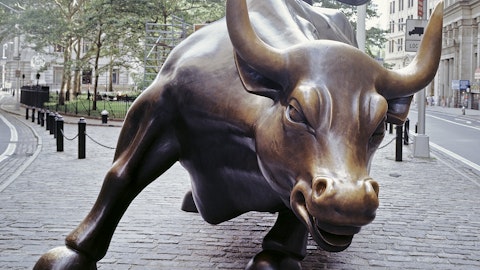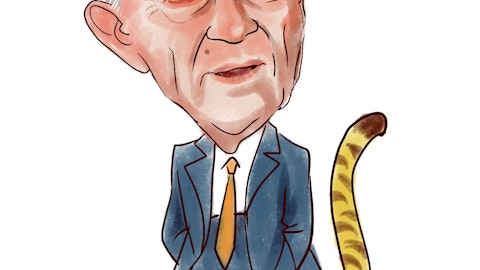2018 should be a good year for financial stocks. Between the GOP tax overhaul and the Fed planning to speed up interest rate hikes, banks and other financial companies should continue to enjoy their rally that they registered in 2017. Moreover, banking stocks should enjoy further growth next year if the Trump administration continues to remove the regulatory burdens that slowed down banks’ growth since the financial crisis. In the meantime, the Financial Select Sector SPDR Fund (NYSEARCA:XLF) is up by 20% since the beginning of the year and many analysts believe that the rally will continue next year as well.
In addition, the financial industry will continue to be disrupted by technology. In the last couple of years, a couple of trends emerged that poise to reshape the industry. Peer-to-peer lending allows people to borrow money without resorting to banks. Many of us have apps in our smartphones that allow to invest and manage finances easier. The latest trend in the industry is the blockchain technology, which should allow people to transfer money internationally without involving third-parties, such as banks or payment services companies. Moreover, banks have embraced the blockchain technology and are developing their own blockchain-based systems.
Nevertheless, finance stocks seem like a good investment opportunity given analysts’ consensus opinion that they will enjoy strong returns in 2018. But the question is which stocks in the sector are the best to invest in. One way to approach this question is to minimize the risk and invest in a finance-focused ETF like the Financial Select Sector SPDR Fund (NYSEARCA:XLF), which would offer exposure to a basked of financial stocks. Another approach it to identify several stocks and analyze each of them individually and a great point to start the search is by looking at financial stocks that hedge funds like to invest in. With this in mind, we have selected five favorite financial stocks among some 650+ hedge funds we track.

Copyright: kritchanut / 123RF Stock Photo
We should mention that blindly following hedge funds into their favorite stocks is not always a good idea for many reasons, such as a higher risk tolerance that smart money can afford due to their much larger size compared to smaller individual investors. Therefore, even the stocks that hedge funds are collectively bullish on require some additional analysis. However, there is a way to use hedge funds’ favorite stock picks and score market-beating returns. At Insider Monkey, we have conducted extensive research into hedge funds’ stock picks and identified an investment strategy, which has returned over 67% since May 2014, beating the S&P 500 ETF (SPY) by over 20 percentage points. The strategy involves our proprietary methodology of identifying the best stocks in the small-cap space that the best-performing hedge funds tracked by us are bullish on. You can read more details about our strategy and download a sample report by accessing this link.
Having said that, let’s proceed to discussing the top five favorite financial stocks among hedge funds in our database. In addition, we will see how their sentiment towards these stocks changed over the last year.
Let’s start with Mastercard Inc (NYSE:MA), in which 82 funds from our database reported long positions as of the end of September, unchanged over the quarter. However, the total value of their positions went up to $8.75 billion from $7.73 billion and represented around 5.60% of the company’s outstanding stock. A year earlier, there were 84 investors with stakes in Mastercard Inc (NYSE:MA) worth $7.48 billion in aggregate.
Earlier this month, Mastercard Inc (NYSE:MA) raised its quarterly dividend by 14% to $0.25 per share and approved a new $4 billion stock buyback program to be implemented after the current one is completed. On the other hand, the company’s finances might be affected by fines from the European Commission on antitrust violations that could reach $1.0 billion, although more details on the issue are yet to be revealed. Overall, Mastercard Inc (NYSE:MA)’s stock has gained over 46% since the beginning of the year as the company reported strong quarterly revenue growth and posted better than expected EPS for the last four quarters and missed the revenue expectations one quarter.
Then there is JPMorgan Chase & Co. (NYSE:JPM). During the third quarter, the number of investors long the stock inched down by two to 104, while the aggregate value of their positions increased by 5.60% to $9.93 billion. Compared to September 2016, the number of investors bullish on JPMorgan Chase & Co. (NYSE:JPM) increased by six.
JPMorgan Chase & Co. (NYSE:JPM)’s shares have appreciated by nearly 24% year-to-date helped by better-than-expected results reported by the company and positive industry news. For the third quarter, JPMorgan posted EPS of $1.76 and revenue of $26.2 billion, both of which topped the consensus estimates by $0.11 and $970 million respectively. However, the bank’s trading revenue of $3.16 billion was lower than even the bottom expectation of $3.18 billion, although investment banking revenue of $1.71 billion was better than the estimated $1.65 billion.
In Visa Inc (NYSE:V), there were 106 funds in our database with stakes worth $12.72 billion at the end of September, versus 115 funds and $12.79 billion, respectively, a quarter earlier, and 115 funds and $10.26 billion, respectively, at the end of September 2016.
Visa Inc (NYSE:V)’s stock is 46% in the green since the beginning of the year and some analysts are optimistic that the stock will extend its gains next year and still consider that its undervalued. For example, in October, after Visa posted its third-quarter results, Evercore analysts reiterated their confidence in Visa Inc (NYSE:V) citing the company’s pricing power and accretion from Visa Europe, which Visa acquired in 2016. SunTrust also reiterated their ‘Buy’ rating on the stock after the earnings report, pointing out that the stock is undervalued and is not trading with the premium of “shiny new objects” in the payments sector, such as Paypal Holdings Inc (NASDAQ:PYPL) and Square Inc (NYSE:SQ).
Citigroup Inc (NYSE:C) saw the number of funds bullish on its stock advance by two to 116 between July and September, while the aggregate value of their holdings surged to $11.49 billion from $10.78 billion and was equal to 5.80% of the company’s outstanding stock.
Citigroup has been focusing on its credit card business, which amasses over 23% of its total lending, which is significantly higher compares to its other peers among major banks such as JPMorgan Chase & Co. (NYSE:JPM), Bank of America Corp (NYSE:BAC) and Wells Fargo & Co (NYSE:WFC). Citigroup is also the largest card lender in the world and is the second-largest in the US in terms of balances, according to the Nilson Report cited by the Wall Street Journal. In addition, Citigroup has approved a $19 billion capital return program that includes stock buybacks and dividends and the company’s management has set ambitious plans, such as a $9.0 in EPS to reach by 2020 (vs estimates of $7.80), although this target might be raised on the back of the new tax bill.
The favorite financial stock among the investors tracked by Insider Monkey is Bank of America Corp (NYSE:BAC), in which there were 133 funds with stakes worth $29.35 billion at the end of September. During the third quarter, the number of funds long the stock inched up by one, but the total value of their holdings surged by 140%.
The increase in the aggregate value is due to billionaire Warren Buffett’s Berkshire Hathaway initiating a stake in Bank of America Corp (NYSE:BAC) during the third quarter and amassing a $17.21 billion position containing 679 million shares. The position was acquired after Berkshire exercised its warrants and bought shares at $7.14 apiece. Moreover, compared to the end of September 2016, Bank of America Corp (NYSE:BAC) remained the favorite financial stock among hedge funds, although a year earlier there were 112 funds holding $7.25 billion worth of shares. Earlier this month, Bank of America Corp (NYSE:BAC) has obtained a patent for a potential automated cryptocurrency exchange system aimed at the bank’s business customers. In addition, the bank has secured a $5 billion stock buyback approved by the Fed.
Disclosure: none





